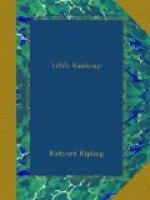The orphan boy, dependent on the charity of Ephraim and his wife, could have felt no gratitude, and must have been a ruffian. He begged for whatever money his protectors would give him, and with that fled down-country for his life. A week after the death of her children Miriam left her bed at night and wandered over the country to find them. She heard them crying behind every bush, or drowning in every pool of water in the fields, and she begged the cartmen on the Grand Trunk Road not to steal her little ones from her. In the morning the sun rose and beat upon her bare head, and she turned into the cool wet crops to lie down and never came back; though Hyem Benjamin and Ephraim sought her for two nights.
The look of patient wonder on Ephraim’s face deepened, but he presently found an explanation. ’There are so few of us here, and these people are so many,’ said he, ‘that, it may be, our God has forgotten us.’
In the house on the outskirts of the city old Jackrael Israel and Hester grumbled that there was no one to wait on them, and that Miriam had been untrue to her race. Ephraim went out and collected bills, and in the evenings smoked with Hyem Benjamin till, one dawning, Hyem Benjamin died, having first paid all his debts to Ephraim. Jackrael Israel and Hester sat alone in the empty house all day, and, when Ephraim returned, wept the easy tears of age till they cried themselves asleep.
A week later Ephraim, staggering under a huge bundle of clothes and cooking-pots, led the old man and woman to the railway station, where the bustle and confusion made them whimper.
‘We are going back to Calcutta,’ said Ephraim, to whose sleeve Hester was clinging. ‘There are more of us there, and here my house is empty.’
He helped Hester into the carriage and, turning back, said to me, ’I should have been priest of the synagogue if there had been ten of us. Surely we must have been forgotten by our God.’
The remnant of the broken colony passed out of the station on their journey south; while a subaltern, turning over the books on the bookstall, was whistling to himself ‘The Ten Little Nigger Boys.’
But the tune sounded as solemn as the Dead March.
It was the dirge of the Jews in Shushan.
THE LIMITATIONS OF PAMBE SERANG [Footnote: Copyright, 1891, by MACMILLAN & Co.]
If you consider the circumstances of the case, it was the only thing that he could do. But Pambe Serang has been hanged by the neck till he is dead, and Nurkeed is dead also.
Three years ago, when the Elsass-Lothringen steamer Saarbruck was coaling at Aden and the weather was very hot indeed, Nurkeed, the big fat Zanzibar stoker who fed the second right furnace thirty feet down in the hold, got leave to go ashore. He departed a ‘Seedee boy,’ as they call the stokers; he returned the full-blooded Sultan of Zanzibar—His Highness Sayyid Burgash, with a bottle in each hand. Then he sat on the fore-hatch grating, eating salt fish and onions, and singing the songs of a far country. The food belonged to Pambe, the Serang or head man of the lascar sailors. He had just cooked it for himself, turned to borrow some salt, and when he came back Nurkeed’s dirty black fingers were spading into the rice.




